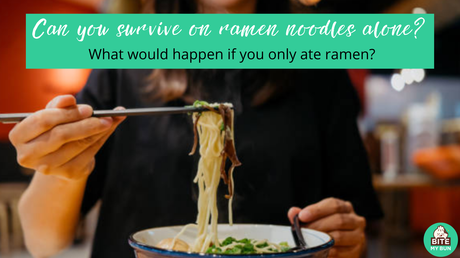Ramen noodles are a popular convenience food, especially with college kids and busy people. Instant ramen is cheap, very easy to make, and quite filling.
However, they are not the healthiest things to eat. Many people may want to save time and money by only eating ramen noodles, but it is just not feasible.

Can you survive on ramen noodles alone?
Technically, you could survive on ramen noodles alone as long as you are providing your body with enough calories.
However, you definitely would not be living a healthy life and you would be at risk for many diseases.
Some of the dangers of living on ramen alone
Listed below are some of the risks associated with having a diet that is comprised of only ramen noodles.
Low fiber & protein
Ramen is often one of those foods that leaves you very full for a short period, but you will find yourself hungry only an hour or two later.
The main reason for this hunger soon after eating is due to the lack of protein and fiber in ramen noodles. Protein and fiber are two components that help to keep us full over longer periods of time.
Protein is important to many body processes including repairing cells and building new cells. Protein is integral to muscle and tissue development and is also important for hair and skin.
If you ate only ramen noodles, you would likely be deficient in protein.
Fiber is important to digestive health and getting adequate fiber in your diet can help protect you from heart disease, stroke, bowel cancer, and type 2 diabetes. Some sources of fiber include fruit and vegetables.
Fiber is also very important because, without adequate fiber, you may experience constipation which can be extremely uncomfortable.
High sodium
Ramen noodles are exceptionally high in sodium. When eaten as part of a balanced diet, this is usually not an issue but if you were to consume only ramen noodles you would be eating dangerous levels of sodium.
An average portion of instant ramen contains 1150 mg of sodium. Adults should consume no more than 2300 mg of sodium a day.
If you eat two or three packages of ramen a day, you will be well exceeding your recommended sodium intake.
Long-term consumption of excess sodium can increase your risk of high blood pressure, stroke, and heart disease. In the short term, excess sodium can cause water retention which can lead to feeling sluggish and bloated.
Bloating can be really uncomfortable, and when it is coupled with lack of fiber, you may have a lot of gastric discomforts.
All of this sodium can also lead to dehydration, which can leave you feeling foggy, tired and generally unwell.
Lack of micronutrients
Ramen offers little to no micronutrients, which are vitamins and minerals that are essential to good health.
Essential micronutrients include about 30 vitamins and minerals that our body can’t make enough of on its own. We have to get these minerals and vitamins from food in order to maintain good health.
Ramen noodles do contain riboflavin and thiamine but sorely lack most other vitamins and minerals.
One common disease that you have probably heard of that is attributed to a lack of vitamin C is scurvy. This disease was common historically among sailors who would be at sea for many months without access to fresh fruit or vegetables.
Scurvy causes bleeding gums and listlessness and can be fatal.
Getting scurvy in the modern day is rare, but if you survived on a diet of ramen noodles alone, you would definitely become deficient in vitamin C along with many other vitamins and minerals.
When you have a lack of vitamins and minerals in your food, you are at risk for many other health issues as well, such as heart disease, osteoporosis, type 2 diabetes, and cancer.
Also read: Is eating dry, uncooked ramen bad for you?
Recap
With all this being said, you can technically survive on a diet of ramen noodles and water, provided that you are eating enough calories from the noodles and perhaps enhance the meal with some great ramen toppings.
The average adult needs about 2000 calories a day, so you would have to eat between 2 and 4 packages of ramen (depending on the brand and serving size).
However, just because you can technically survive off of ramen noodles does not mean that they should be the only thing in your diet.
By eating only ramen noodles long-term, you are putting yourself at a risk for a whole host of problems such as heart disease, type 2 diabetes, high blood pressure, and even potentially cancer from a lack of micronutrients.
In the short term, if this is all your diet consists of, you will likely feel sluggish, bloated, and constipated and may even experience brain fog from dehydration.
Ramen is convenient and cheap, so it can definitely be incorporated into a balanced diet. The saying “everything in moderation” applies here – enjoy ramen as part of a healthy diet.
Read next: Is Ramen Soup? Or is it something else? Here’s what the experts say
